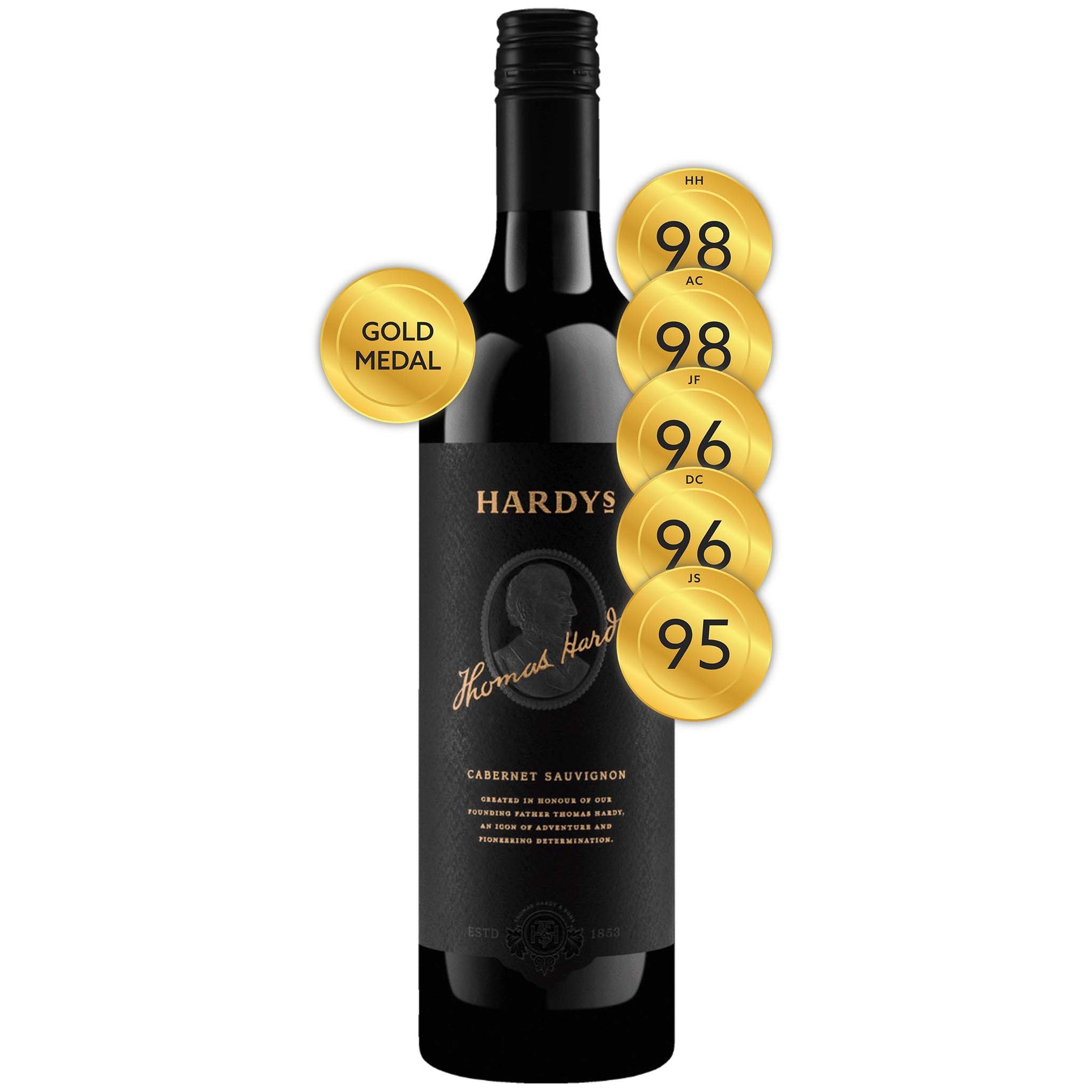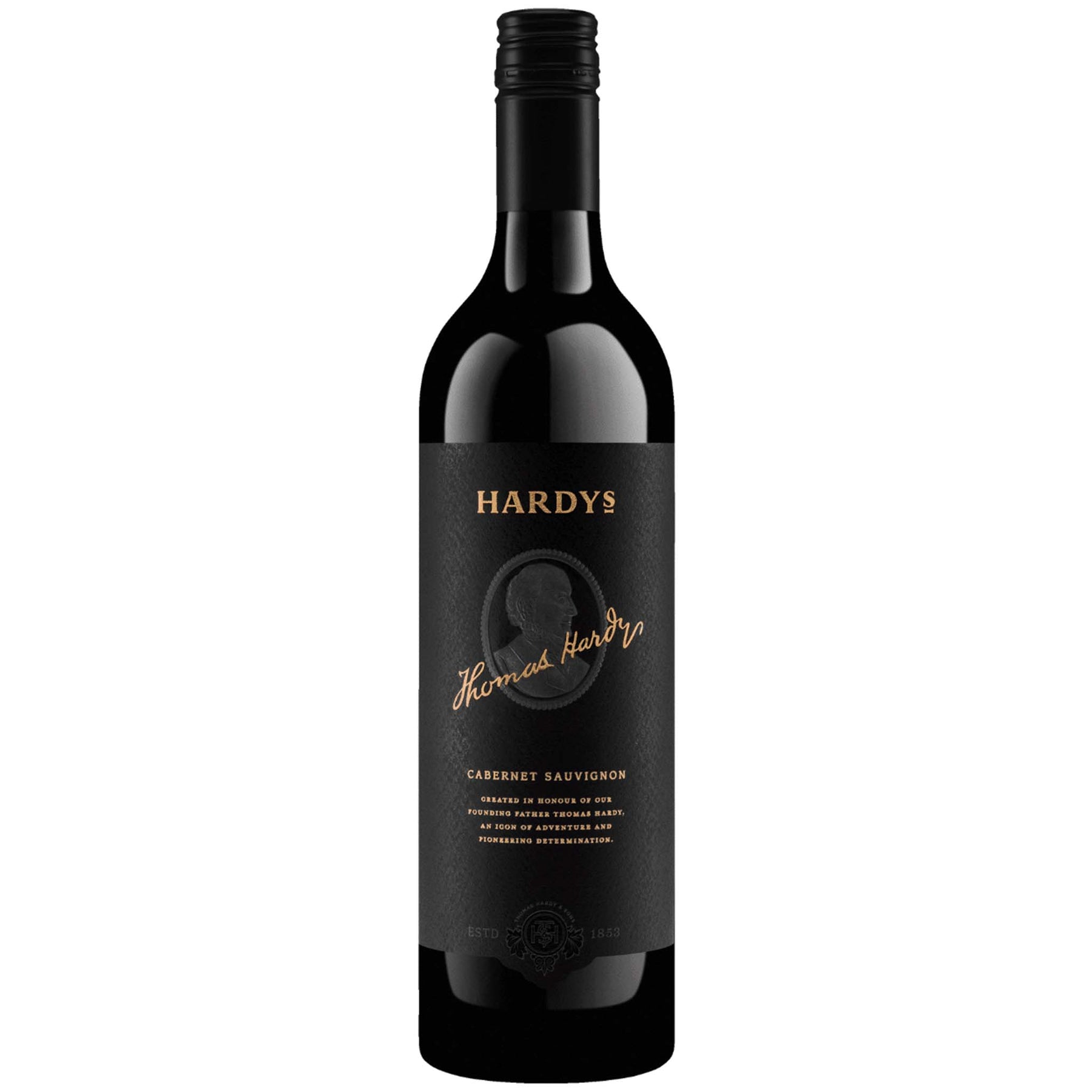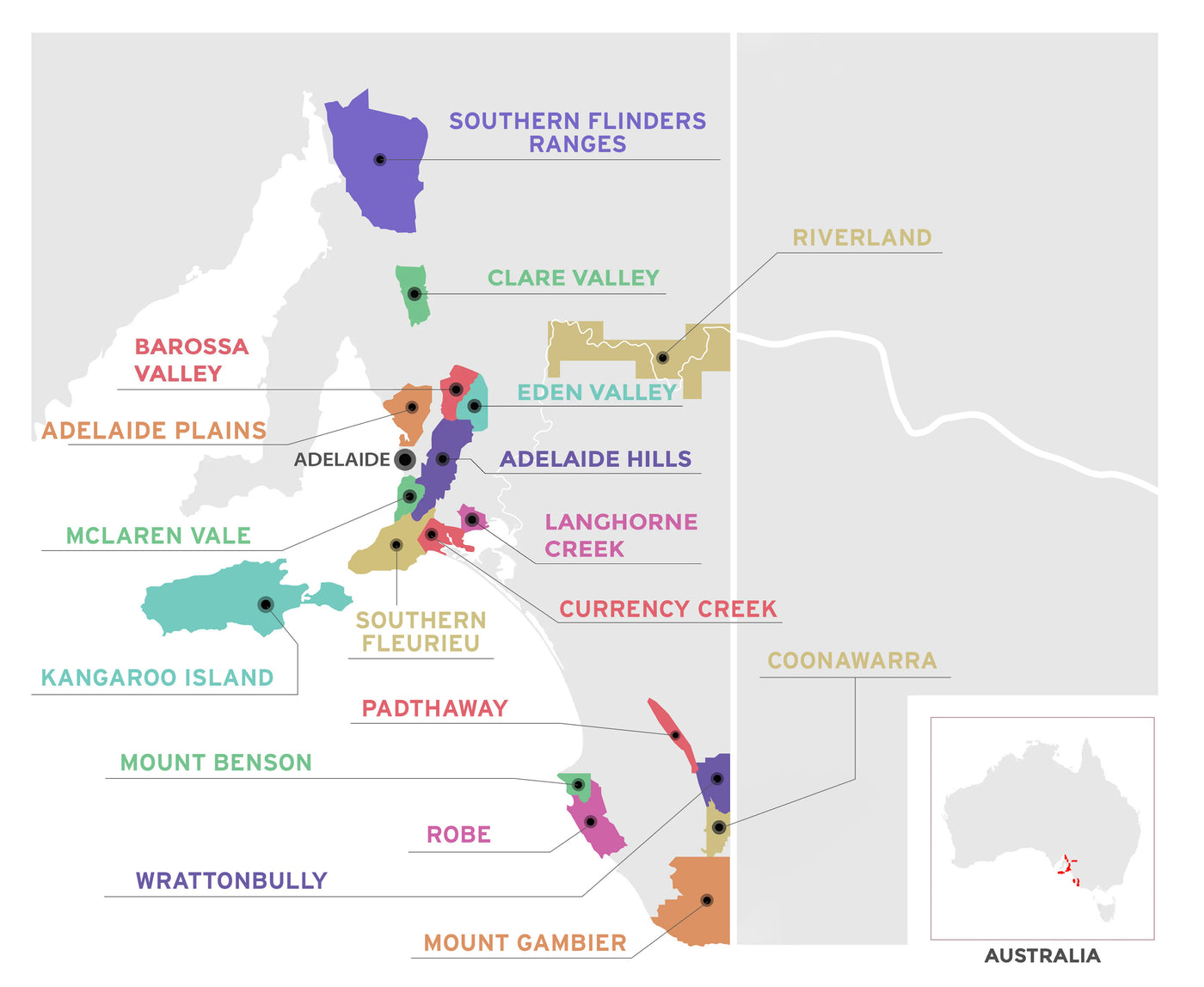

Hardys Thomas Hardy Cabernet Sauvignon 2017
Style: Red Wine
Varieties: Cabernet Sauvignon (92%), Merlot (5%), Malbec (3%)
Closure: Screwcap
Hardys Thomas Hardy Cabernet Sauvignon 2017
Warehouse
34 Redland Drive
Vermont VIC 3133
Australia
Critic Score: 98
Alcohol: 14.3%
Size: 750 ml
Drink by: 2045
The Hardy wine empire was established in 1853 by Thomas Hardy, generally regarded as the father of the wine industry in South Australia. When Hardys celebrated its 150th anniversary in 2003, more than 7.6 million cases of wine were being sold worldwide under the brand each year, and Hardys Wines was the second most powerful wine brand globally. The Hardys Thomas Hardy Cabernet sauvignon is the pinnacle of their winemaking and a fitting tribute to their founder. The 2017 vintage, a rarely encountered fusion of finesse, length and intensity, is sourced from Coonawarra.
"Very deep, rich colour, with a similarly rich, multi-faceted bouquet of pinpoint ripe cabernet welded to stylish oak. A full-bodied powerful, concentrated cabernet with with tremendous staying power. Blackberries and blackcurrants overflowing. A delicious fruit-sweet mid-palate. A statuesque cabernet of the highest order. This would stand tall beside a top growth Bordeaux." Huon Hooke
"Vivid crimson with brilliant hue. Youthful aromatics of fresh plums, red & blackberry fruits, mulberry and spices of clove, cinnamon, fragrant wild mint with subtle cedar oak influence. Tight and muscular frame with a wave of fresh dark plums, mulberry and ripe blackberry fruit moving to a more structural finish with beautifully integrated oak and fine natural tannins leading to a long mouth-watering finish." Hardys

Expert reviews
"Very deep, rich colour, with a similarly rich, multi-faceted bouquet of pinpoint ripe cabernet welded to stylish oak. A full-bodied powerful, concentrated cabernet with with tremendous staying power. Blackberries and blackcurrants overflowing. A delicious fruit-sweet mid-palate. A statuesque cabernet of the highest order. This would stand tall beside a top growth Bordeaux. Drink: 2022-2039." Huon Hooke, The Real Review - 98 points
"Deep crimson. Classic cassis, blackberry, black olive tapenade, leafy aromas with vanilla, cedar notes. Well balanced powerful wine with saturated blackcurrant, dark plum, praline, brambly flavours, fine grainy/ al-dente tannins, and underlying cedar oak complexity. Finishes leafy firm with plentiful dark fruits and extract. Superb fruit definition, volume and torque. Cellar for a while. Drink to: 2024 - 2040." Andrew Caillard MW, The Vintage Journal - 98 points
"Deep mulberry notes lead to a palate of spiced crimson, cranberries, damsons, liquorice, cloves and chocolate. The concentrated oak tannins are richly textured. It's a balanced powerhouse built for aging, and a genuinely varietal wine with strong personality." Decanter World Wine Awards 2022 - 96 points
"It seems this vintage of Thomas Hardy is straight Coonawarra (often it’s a multi-regional blend). Excellent dark purple hue. It's deep, rich and complex. More savoury accents among the hint of cassis and currants. Concentrated, with a density across the full-bodied palate, yet the oak is seamlessly integrated, the tannins ripe and plush. A rather polished wine, built for aging. Drink by 2044." Jane Faulkner, Halliday Wine Companion - 96 points
"Australia’s two great cabernet regions, Coonawarra and Margaret River, blended together to deliver a powerful and intense style. Aromas of cassis and black cherry as well as cedar and coal dust, roasting herbs and a dark stones. Spicy oak throughout. The palate has nicely groomed tannins and a polished intensity. Concentrated but composed. Drink over the next decade. Screw cap." James Suckling, JamesSuckling.com - 95 points
Awards
Gold Medal - 2022 Decanter World Wine Awards
Thomas Hardy

The Hardy wine empire was established in 1853 by Thomas Hardy, generally regarded as the father of the wine industry in South Australia. Thomas migrated to Australia in 1850 at the age of 20 with just £30 in his pocket and went to work in the vineyard for John Reynell at the Chateau Reynella winery. Reynell was the first to plant a vineyard in McLaren Vale and made his first vintage in 1842.
Within a year Hardy trekked to the Victorian goldfields to earn some money. Two years later he returned to South Australia and purchased a property on the River Torrens in the outskirts of Adelaide. He named the property Bankside, planted vines in 1853 and Hardys Wines was born. In 1857 he made his first wine, matured in a cellar which he dug by hand at night after his day's labours in the fields.
By 1859 Hardy was exporting wine to England and marketing his wine throughout South Australia and business was so successful that by the mid 1870s Hardy's Bankside Cellars were close to their production capacity and the wine company was looking to expand. In 1976 he purchased the Tintara Winery and vineyard in McLaren Vale when it went bankrupt. He was the only bidder for the 283 hectare property. Hardy recouped the total purchase price from the first year sales of the accumulated wine stocks that came with the purchase.
From this point on the business grew rapidly. In 1881 a large head office was built in Adelaide and in 1884 a further 195 hectares adjoining Tintara were purchased. In 1887 Hardy's three sons joined the business and Hardys Wines became Thomas Hardy & Sons, with sons James, Thomas Nathaniel and Robert leading the company into the next century. This marked the formalization of a family legacy that would endure for generations.
By 1895 Hardys had overtaken Seppelt as the largest winemaker in Australia, with a vintage of 1.5 million litres. In addition, Hardy played an instrumental role in protecting South Australia's vineyards from the scourge of phylloxera as a founding member of the Phylloxera Board in 1889. Federation in 1901 and the opening of State borders to free interstate trade offered Thomas Hardy & Sons another major opportunity. Within weeks of Federation the company opened offices in Sydney and Melbourne, followed by Brisbane in 1905. In 1904 his original winery at Bankside burned down but Thomas took it in his stride, moving on to a new larger site at Mile End. In 1910 Thomas's son Robert took over management of the company.
Thomas Hardy passed away in 1912, two days shy of his 82nd birthday. His contributions to the South Australian wine industry were immeasurable. His dedication, innovation and unwavering commitment to quality established the foundations of the region’s winemaking prowess. From pioneering exports to embracing technological advancements, Hardy’s legacy continues to live on in the vineyards and wineries of McLaren Vale and beyond.
His journey started as a young man who boarded a ship to Australia in 1850 with £30 to his name and by the time he died he was known as the father of the South Australian wine industry. His vision, perseverance, hard work and tenacious spirit built a company that is still going strong over 170 years later.
As a tireless promotor of Australia's wine industry, Hardy became the first Australian winemaker to be honoured by his local community, with the people of McLaren Vale erecting a stone plinth to honour his memory some 26 years after his death.
About the winery

The Hardy wine empire was established in 1853 by Thomas Hardy, generally regarded as the father of the wine industry in South Australia. Thomas migrated to Australia in 1850 at the age of 20 and three years later purchased a property on the River Torrens in Adelaide. He named the property Bankside, planted vines and Hardys Wines was born.
By 1859 Hardy was exporting wine to England and marketing his wine throughout South Australia and business was so successful that by the mid 1870s Hardy's Bankside Cellars were close to their production capacity and the wine company was looking to expand. In 1976 he purchased the Tintara Winery and vineyard in McLaren Vale when it went bankrupt.
In 1887 Hardy's three sons joined the business and Hardys Wines became Thomas Hardy & Sons, with sons James, Thomas Nathaniel and Robert leading the company into the next century. This marked the formalization of a family legacy that would endure for generations.
By 1895 Hardys had overtaken Seppelt as the largest winemaker in Australia, with a vintage of 1.5 million litres. Federation in 1901 and the opening of State borders to free interstate trade gave Thomas Hardy & Sons another opportunity to expand - within weeks of Federation the company opened offices in Sydney and Melbourne. In 1904 the original winery at Bankside burned down but Thomas took it in his stride, moving on to a new larger site at Mile End.
Thomas Hardy passed away in 1912, two days shy of his 82nd birthday. He was survived by his son Robert, who had taken over management of the company in 1910. The chain of command passed to Robert’s nephew, Thomas Mayfield Hardy, in 1928, thence to Robert's son, Kenneth Hardy, in 1938 when Thomas Mayfield was tragically killed in a plane crash. His widow Eileen Hardy, a woman of immense character and fortitude, immediately stepped up, taking on a role with Hardys that would define the rest of her life.
The winery celebrated its 100th anniversary in 1953, by which time it had extended its operation to the Barossa Valley and the Riverland on the Murray River. By the early 1960s the fourth generation of the Hardy family was on board, with Tom Mayfield’s eldest son Thomas Walter taking over the running of the company in 1965.
In 1970 it was decided to keep the best 4500-litre parcel of red wine made in the vintage separate and to release it under the Eileen Hardy name. The first Eileen Hardy Shiraz was released in 1973 to mark the 80th birthday of 'Auntie Eileen', the matriarch of the family. Eileen died in April 1980, followed by the death of her son Thomas Walter some 8 months later.
Before his passing, Thomas Walter had suggested the company move to Chateau Reynella, the winery established by John Reynell and the first place Thomas Hardy worked after coming to Australia. In 1982 Thomas Hardy & Sons purchased the heritage site and meticulously restored the beautiful building and grounds (at a combined cost of $5.8 million) to serve as its headquarters.
Hardys Wines continued to explore new regions in Australia and abroad, including wineries in France and Italy. It was a costly time, so Hardys Wines went public. In 1992 the winery moved out of family control when Thomas Hardy & Sons merged with Berri Renmano Ltd, a wine company based in Riverland, to form Australia's second-largest wine group at the time, BRL Hardy Ltd.
Hardys celebrated its 150th anniversary in 2003. It had a lot to celebrate, as more than 7.6 million cases of wine were being sold worldwide under the brand each year, or a staggering 2 million glasses being drunk every day. Hardys Wines was named the number one Australian wine brand and the second most powerful wine brand globally. As ABC National Rural News observed at the time, "Old Thomas Hardy would be very proud of how far his company has reached."
In 2003, BRL Hardy Ltd and Constellation Brands merged to create the world's largest international wine business and was renamed The Hardy Wine Company. In 2006, Constellation Brands acquired Vincor International, adding the West Australian brands of Amberley and Goundrey to the Hardy portfolio. In 2008, The Hardy Wine Company changed its name to Constellation Wines Australia, then to Accolade in 2011.

South Australia
South Australian is responsible for more than half the production of all Australian wine. It is home to more than 900 wineries across 18 wine regions. The regions are Adelaide Hills, Adelaide Plains, Barossa Valley, Clare Valley, Coonawarra, Currency Creek, Eden Valley, Kangaroo Island, Langhorne Creek, McLaren Vale, Mount Benson, Mount Gambier, Padthaway, Riverland, Robe, Southern Fleurieu, Southern Flinders Ranges and Wrattonbully.
Many of the well-known names in the South Australian wine industry established their first vineyards in the late 1830s and early 1840s. The first vines in McLaren Vale were planted at Reynella in 1839 and Penfold's established Magill Estate on the outskirts of Adelaide in 1844.
South Australia has a vast diversity in geography and climate which allows the State to be able to produce a range of grape varieties - from cool climate Riesling in the Clare and Eden Vallies to the big, full bodied Shiraz wines of the Barossa Valley and McLaren Vale. Two of Australia's best-known wines, Penfolds Grange and Henschke Hill of Grace, are produced here. There is much to discover in South Australia for the wine lover.

